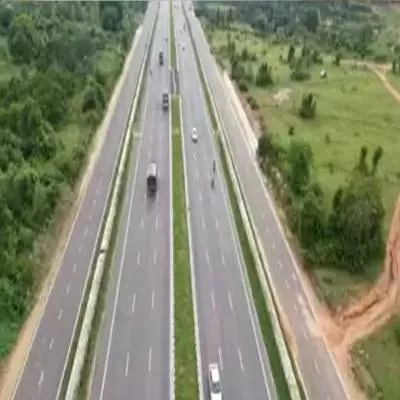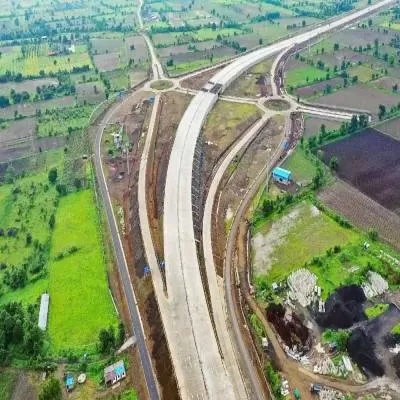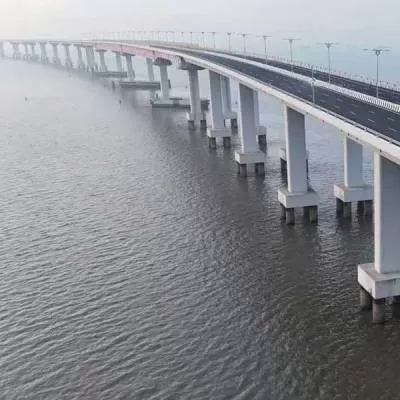- Home
- Infrastructure Transport
- ROADS & HIGHWAYS
- Quick Relief

Quick Relief
With a view to inject fresh liquidity in the realty and construction sector, reduce its debt burden and solve the working capital requirements of developers and contractors, the Cabinet Committee on Economic Affairs (CCEA), under the chairmanship of Prime Minister Narendra Modi, has given the go-ahead to several initiatives for breathing life into a sector beset by dormancy. Proposed by the National Institution for Transforming India (NITI) Aayog, CCEA has approved the payout of 75 per cent of arbitral award amounts by government agencies into an escrow amount in cases where funds are being held back on account of awards being challenged in courts of law. The amount would be paid against a margin-free bank guarantee. Developers and contractors can make use of the escrow account to repay existing debts and source capital for concurrent project requirements. The initiative has been formulated to expedite the progress of stalled projects and provide a mechanism to banks to speed up their loan recovery process, thus leading to unburdening of their loan books. The move is also aimed at renewing the liquidity potential of construction firms, enabling them to bid for fresh projects and expand their portfolios and create a competitive environment wherein there will be a considerable reduction in public works costs.
As part of the effort in streamlining the dispute resolution process and providing quick relief to affected parties, the government has instructed concerned government departments and public-sector units (PSUs) to transfer arbitration cases to the Arbitration Act with the consent of the contractors. The Act comes suitably amended with an expedited procedure. Other measures in the pipeline to revitalise the construction sector include the encouragement of increased use of conciliation and the scanning of a scheme by the Department of Financial Services to help the realty sector get rid of bad loans. The government has also reiterated its commitment to strengthening domestic infrastructure capabilities by providing continuous liquidity to a cash-strapped sector and making a transition to the globally accepted EPC model of executing infra contracts. The emphasis here is on galvanising private investment in the construction sector and fulfilling contractual obligations within the stipulated timeframe with little or no cost overruns. In addition, the prescribed policy initiative also allows for synergising the operational capabilities and project competencies of realty firms and construction companies in building world-class roads, ports and highways, therein strengthening the infrastructural ecosystem of the country. A surging demand for residential units and office spaces has placed the realty and construction sector in the country at an inflection point. Given the fact that the sector accounts for 8 per cent of the country´s GDP, its unhindered growth is exigent for generating large-scale employment and kick-starting the investment cycle in the economy. However, disputes arising between government agencies awarding construction contracts and developers and contractors during various stages of the project construction cycle have resulted in several choke points in the form of cost overruns, delayed project completions and non-adherence with customer handover deadlines.
A three-year stagnation period between 2011 and 2014 in the construction sector led to several projects being stalled, leading to a crisis situation in the employment-intensive sector. The massive stress level of the realty and construction segment has severely strained the economy with data from the Centre for Managing Indian Economy (CMIE) putting the cumulative value of stalled projects at Rs 11.36 lakh crore, with the value of projects under arbitration pegged at Rs 70,000 crore. Exposure of banks to the construction sector has been estimated at an astounding Rs 3 lakh crore. The real-estate sector has been bogged by outstanding loans of Rs 9.60 lakh crore with the percentage of bad loans pegged at 1.6 per cent or Rs 16,000 crore. Credit rating agency Crisil has put the debt of real-estate developers for residential projects at Rs 61,000 crore in 2014-15.
The government agencies have largely been at the receiving-end with a large number of arbitration rulings against them. Out of 347 arbitral awards in the case of National Highways Authority of India (NHAI), the scale heavily weighed in favour of the contractors with 309 rulings while 38 were in favour of the public-sector body; more than 90 per cent of the awards were handed in a unanimous manner wherein all arbitrating parties, including the NHAI-appointed one, agreed to the ruling.
The pendency of claims raised against government bodies is pegged at over 85 per cent with 11 per cent pending with various government agencies, 64 per cent with arbitrators and 8.5 per cent with the courts. With the average claim settlement time estimated at over seven years and the total value of stalled projects pegged at 7 per cent of the national GDP, a speedy and effective dispute resolution mechanism for putting the construction sector into revival mode has become the need of the hour.
Going ahead, the dispute resolution and liquidity enhancing measures of the government are expected to resuscitate the realty and construction sector and place it on a faster growth trajectory, enabling it to play a larger and defining role in economic development and national progress.
About the authors:
Ajay Monga, Partner, SNG & Partners, had been a litigation lawyer. His areas of practice are banking and finance and dispute resolution (arbitration), to name a few.
Varsha Kripalani, Partner with SNG & Partners for almost two decades, is a corporate lawyer. She had been a core litigation lawyer for over a decade and now heads the HR practice of the firm.
To share your views on this article, write in at feedback@ConstructionWorld.in
The government´s measures aim to alleviate the stress maladies of the construction industry, explain AJAY MONGA and VARSHA KRIPALANI. With a view to inject fresh liquidity in the realty and construction sector, reduce its debt burden and solve the working capital requirements of developers and contractors, the Cabinet Committee on Economic Affairs (CCEA), under the chairmanship of Prime Minister Narendra Modi, has given the go-ahead to several initiatives for breathing life into a sector beset by dormancy. Proposed by the National Institution for Transforming India (NITI) Aayog, CCEA has approved the payout of 75 per cent of arbitral award amounts by government agencies into an escrow amount in cases where funds are being held back on account of awards being challenged in courts of law. The amount would be paid against a margin-free bank guarantee. Developers and contractors can make use of the escrow account to repay existing debts and source capital for concurrent project requirements. The initiative has been formulated to expedite the progress of stalled projects and provide a mechanism to banks to speed up their loan recovery process, thus leading to unburdening of their loan books. The move is also aimed at renewing the liquidity potential of construction firms, enabling them to bid for fresh projects and expand their portfolios and create a competitive environment wherein there will be a considerable reduction in public works costs. As part of the effort in streamlining the dispute resolution process and providing quick relief to affected parties, the government has instructed concerned government departments and public-sector units (PSUs) to transfer arbitration cases to the Arbitration Act with the consent of the contractors. The Act comes suitably amended with an expedited procedure. Other measures in the pipeline to revitalise the construction sector include the encouragement of increased use of conciliation and the scanning of a scheme by the Department of Financial Services to help the realty sector get rid of bad loans. The government has also reiterated its commitment to strengthening domestic infrastructure capabilities by providing continuous liquidity to a cash-strapped sector and making a transition to the globally accepted EPC model of executing infra contracts. The emphasis here is on galvanising private investment in the construction sector and fulfilling contractual obligations within the stipulated timeframe with little or no cost overruns. In addition, the prescribed policy initiative also allows for synergising the operational capabilities and project competencies of realty firms and construction companies in building world-class roads, ports and highways, therein strengthening the infrastructural ecosystem of the country. A surging demand for residential units and office spaces has placed the realty and construction sector in the country at an inflection point. Given the fact that the sector accounts for 8 per cent of the country´s GDP, its unhindered growth is exigent for generating large-scale employment and kick-starting the investment cycle in the economy. However, disputes arising between government agencies awarding construction contracts and developers and contractors during various stages of the project construction cycle have resulted in several choke points in the form of cost overruns, delayed project completions and non-adherence with customer handover deadlines. A three-year stagnation period between 2011 and 2014 in the construction sector led to several projects being stalled, leading to a crisis situation in the employment-intensive sector. The massive stress level of the realty and construction segment has severely strained the economy with data from the Centre for Managing Indian Economy (CMIE) putting the cumulative value of stalled projects at Rs 11.36 lakh crore, with the value of projects under arbitration pegged at Rs 70,000 crore. Exposure of banks to the construction sector has been estimated at an astounding Rs 3 lakh crore. The real-estate sector has been bogged by outstanding loans of Rs 9.60 lakh crore with the percentage of bad loans pegged at 1.6 per cent or Rs 16,000 crore. Credit rating agency Crisil has put the debt of real-estate developers for residential projects at Rs 61,000 crore in 2014-15. The government agencies have largely been at the receiving-end with a large number of arbitration rulings against them. Out of 347 arbitral awards in the case of National Highways Authority of India (NHAI), the scale heavily weighed in favour of the contractors with 309 rulings while 38 were in favour of the public-sector body; more than 90 per cent of the awards were handed in a unanimous manner wherein all arbitrating parties, including the NHAI-appointed one, agreed to the ruling. The pendency of claims raised against government bodies is pegged at over 85 per cent with 11 per cent pending with various government agencies, 64 per cent with arbitrators and 8.5 per cent with the courts. With the average claim settlement time estimated at over seven years and the total value of stalled projects pegged at 7 per cent of the national GDP, a speedy and effective dispute resolution mechanism for putting the construction sector into revival mode has become the need of the hour. Going ahead, the dispute resolution and liquidity enhancing measures of the government are expected to resuscitate the realty and construction sector and place it on a faster growth trajectory, enabling it to play a larger and defining role in economic development and national progress. About the authors: Ajay Monga, Partner, SNG & Partners, had been a litigation lawyer. His areas of practice are banking and finance and dispute resolution (arbitration), to name a few. Varsha Kripalani, Partner with SNG & Partners for almost two decades, is a corporate lawyer. She had been a core litigation lawyer for over a decade and now heads the HR practice of the firm. To share your views on this article, write in at feedback@ConstructionWorld.in




















